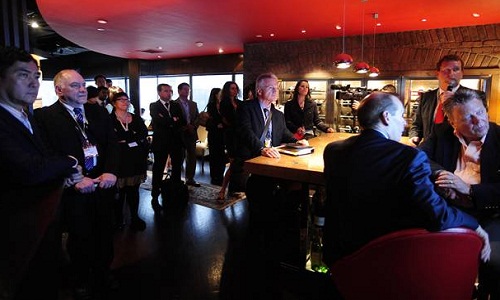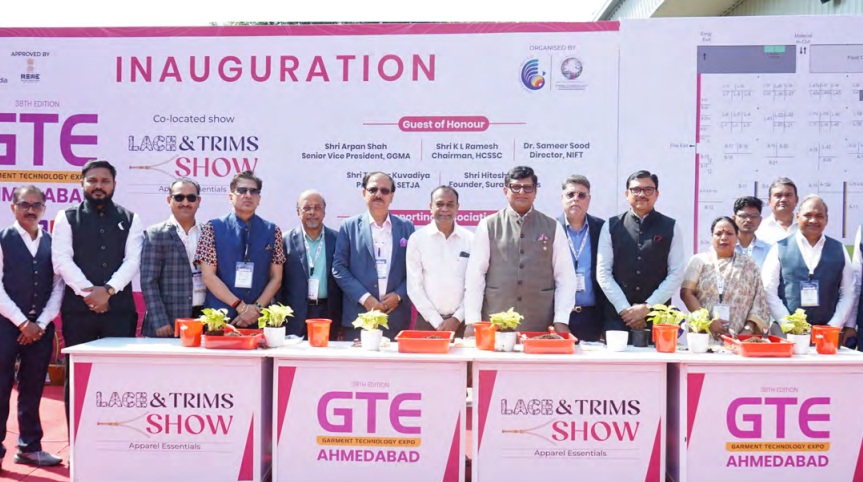FW
"Hong Kong is getting ready for the annual Prime Source Forum from March 13-14, 2017 at the The Langham Hong Kong. Some 350 senior executives from the global fashion supply chain from raw materials to e-retail are expected to attend the two day forum."

Hong Kong is getting ready for the annual Prime Source Forum from March 13-14, 2017 at the The Langham Hong Kong. Some 350 senior executives from the global fashion supply chain from raw materials to e-retail are expected to attend the two day forum.
Since its debut in 2006, Prime Source Forum (PSF) is perceived as one of the most beneficial and effective promotional channels for the global fashion industry. Held annually in Hong Kong, PSF brings together some 400 senior executives from more than 20 countries to discuss the challenges and opportunities that manufacturers, suppliers and retailers are facing in the apparel supply chain. Perhaps, this is called a forum and not a conference as delegates involvement are an important element of its success. Prime Source Forum (PSF) is not limited to sourcing and supply chain alone it also is a valuable source of information for the fashion industry.

“Sourcing managers in my or senior levels no longer visit local and overseas trade fairs to look for new products nowadays. We consider new suppliers by existing connections, selected referrals or find them at high-end conferences. Ideally, new suppliers are coming to us and display their innovations so that we can make decisions here immediately,” explains M Lo, Sourcing Manager, Far East one Europe’s top three apparel retailers. This is why PSF is still serving the industry even after so many years.
The line up in this edition Year 2017 is shaping up to be a pivotal year for fashion industry. Topical themes and how the industry should respond to it will be covered. The keynote address will be by Colin Browne, President, Global Sourcing, Under Armour. The first session ‘Global trade – what is the regulatory landscape going to look like’ will offers suggestions to hedge against the geo-economic uncertainties in the new sourcing landscape and where we are heading with global trade will be discussed in this session. This will be followed by CEO dialogues on how digitising quality control helped Quiksilver increase supply chain transparency, supplier collaboration and employee engagement would offer industry best practices. Bart De Meirsman, MD, Quiksilver Asia Sourcing and Stephane Boivin, Co-founder, President & CEO, Pivot88 will be the main participants. Session 2 will throw light on survival under global political frictions and economic uncertainty – How we can navigate an uncertain future. Debate on ‘Sourcing 2020, what does the future fashion sourcing landscape hold?’ would help in brainstorming strategies for future. CEO Dialogue will be on ‘The future consumer; sourcing in future’ by Anson BAILEY, Principal, Business Development, KPMG.
The second day will start with a keynote address by Arkebe Oqubay, Minister and Special Advisor to the Prime Minister, the Federal Democratic Republic of Ethiopia. The following session will offer insights on the challenges and opportunities of developing the fashion supply chain in Africa as well as CEO Dialogues on sourcing responsibly in Africa. It will be followed by World Fashion Design Award Ceremony. Apart from this, there will be sessions on changes on fashion supply chain management in prevalence of e-tailing; business advancement – key to survive in the disruptive era and engaging CEO Dialogues on SAC's vision 2020 on transparency By Jason Kibbey, CEO, Sustainable Apparel Coalition. Day 2 will also have a session on ‘Changes on fashion supply chain management in prevalence of e-tailing’.
Strong line up
PSF offers ample opportunity for delegates to network with their peers, mingle with expert panelists and exchange ideas with their peers and competitors alike on issues of mutual interest. The speakers are industry leaders and key decision makers. No. of estimated registrants: Some 350 senior executives of the global fashion supply chain from raw materials to e-retail The speaker line up have names like Arkebe Oqubay, Minister and Special Advisor to the Prime Minister, the Federal Democratic Republic of Ethiopia, Phan Chi Dung, Director General, Light Industry Department, Ministry of Industry and Trade, Vietnam, Anson Bailey, Principal, Business Development, KPMG, to Brice Berrard, MD, TeamWorld, Eram Group, Anne-Laure Descours, Global Director, Sourcing Apparel, Puma, Mark Green, EVP, Global Supply Chain, PVH among many, many others.
Prime Source Forum (PSF) was initiated by APLF in 2006 to address the issue of quota elimination in the apparel industry. After its staging in the industry for eight years, PSF is now organised by YEH SHEN under licence of APLF. APLF is a joint-venture between UBM Asia and the SIC Group of France. For over two decades, Hong Kong-based APLF has been providing the global leather and fashion industries with its most important meeting and trading places. Josephine Ching, person in charge of PSF under the organisation of UBM Asia from 2007-13, is now Event Director of YEN SHEN which has been incorporated in Hong Kong since 2006. Starting from October 2013, PSF is organised by YEH SHEN under licence of APLF.
"Indeed with a global supply chain, international talent pool, dependence on new wealth creation, upward socio-economic mobility et al, fashion has benefitted greatly from globalization. But with a new political order it stands to suffer with new curbs on free movement of people, products, and uncertainty at a time when many consumers are already feeling less secure, feels Alexander Betts, Leopold Muller Professor of Refugee & Forced Migration Studies, Oxford University."

Indeed with a global supply chain, international talent pool, dependence on new wealth creation, upward socio-economic mobility et al, fashion has benefitted greatly from globalization. But with a new political order it stands to suffer with new curbs on free movement of people, products, and uncertainty at a time when many consumers are already feeling less secure, feels Alexander Betts, Leopold Muller Professor of Refugee & Forced Migration Studies, Oxford University.
TPP: Fashion industry Trumpified

With Donald Trump becoming the President of the US a sense of uncertainty has gained ground. One of his first moves was to pull out of Trans-Pacific Partnership, a 12-nation agreement, designed to encourage trade between a block of countries by reducing import-export duties. Meanwhile Trump has also warned about punitive tariffs or the ‘Border Adjusted Tax’ and quotas to restrict import of goods from countries like Mexico and China.
Focusing on ‘Made in America’, he believes reshoring production would enhance competitiveness. But the West — after losing ground to Asia for decades — currently lacks the skilled labour pool and modern equipment necessary for mass garment manufacturing. What’s more, the high cost of labour in the US and Europe would also eliminate profit margins and make it impossible for companies to maintain prices.
For fashion, the most drastic consequence of the political shift in the US is the resurgence of protectionist trade policies. Many businesses have spent years building global supply chains and outsourcing their production to China, Vietnam, Bangladesh and the like. As per American Apparel and Footwear Association, nearly 97 per cent of clothing and 98 per cent shoes sold in the US are imported from overseas.
Brexit impact on business
Meanwhile with the Britons voting to withdraw from the European Union the value of the pound tumbled. With uncertainties prevailing around Brexit, Britain’s imports of garments were affected. Take for example Bangladesh, garment shipments to the UK, Bangladesh's third largest export destination, declined 5.19 percent in the first half of 2016-17 in what can be termed as a harbinger of the Brexit fallout, expected to take effect in 2019. Between July and December last year, Bangladesh's garment exports to the UK stood at $1.53 billion, according to data from the Export Promotion Bureau. And experts believe garment exports to the UK will face further challenges in the near future as British consumers are facing rising inflation and weakness of the pound.
British clothing retailer Next for example recently warned about a tough trading year ahead. UK, being a developed country and a major consumption center, imports a variety of textile and apparel products from the world. Textile and apparel export is also predominant in total merchandise exports of India to UK vis-à-vis EU. Textile and apparel exports accounted for more than one fourth of merchandise exports to UK while it has a share of 21 per cent in the total exports to EU during 2015-16. In short, Brexit will have negative implications on UK’s textile and apparel imports due to the devaluation of the Pound.
In fact, global suppliers are full of trepidation, fearing exports could face hurdles in the US, UK and European markets some of the biggest importers. For Vietnam US is one of the biggest export market with 50 per cent of its total textile and garment exports going to the US. From January to November 2016, Vietnam’s textile and garment shipments to the US edged up 4.7 per cent from the previous year. The TPP would have eliminated 17 per cent tariff on imports of garments from Vietnam. However, even in the absence of TPP, Vietnam’s economy is well positioned to continue growing, with various other trade deals giving it good access to international markets, including the recently negotiated EU free trade deal and other agreements.
Similarly Bangladesh will have to address three important factors -- higher productivity, workers' wage hike and profitability – for sustainability of the apparel sector, say experts. RMG sector contributes 13 per cent to GDP. To achieve $50 billion export target Bangladesh will have to earn $22 billion in the next five year with a 12 per cent growth. Manufacturers have been spending millions of dollars on remediation and relocation of factories. A slowdown in exports and weak remittance growth are the challenges for Bangladesh. The EU and the US account for over 70 per cent of exports, and weaker growth, together with retreat from trade liberalisation, could adversely affect export growth, mainly the garment industry, with a negative impact on the balance of payments.
China of course is the world’s largest textile and apparel supplier. But the country is facing issues with rising costs making it lose ground globally. Meanwhile, with President Trump at the helm China is also evaluating its effects on its textile and apparel exports. China has, in any case, been shifting its production to other low-cost countries such as Vietnam, Laos, Bangladesh and even Africa, including Ethiopia and Kenya. Near 37.4 percent of total Chinese textile and apparel exports were destined for the US in fiscal year 2014-15. However, a further decline is expected this year. China’s global textile and apparel exports in 2015 was $284.2 billion whereas the first quarter of 2016 stood at $90 billion (a decline of 5 percent year over year). Chinese companies pursue an “operate-from-within-the-market” strategy for the US by setting up operations there. They have been looking at acquisitions of textile producing units.
Africa is the other upcoming sourcing destination. Fashion goods from Africa benefit from tariff free access to the UK market as a part of the EU trade policy, which makes them significantly cheaper than products imported from Asia. African goods have a 12 per cent advantage over Chinese items. However, the zero tariffs and zero quotas regimes are now at risk with Brexit. African countries want the UK to maintain the tariff free market access for their fashion products. As UK and European retailers and brands seek to innovate and strengthen their market position by diversifying existing supply chains, Africa provides a new source for ready-to-wear garments, shoes and fashion accessories.
The Turkish economy is heavily dependent on the fashion industry. As per Euromonitor textiles accounted for the greatest share (18.5 per cent) of total goods exported from Turkey in 2015. In monetary terms, the value of clothing exported reached $16.8 billion in 2015. However, even though Turkey has faced political upheaval and terrorist activities, its focus on supplying fashion to Britain and further afield shows no sign of abating. Although more expensive than their counterparts in Asia, Turkish manufacturers can offer faster delivery times and the flexibility to repeat in season. Asia cannot compete with Turkey's close proximity to the UK and Europe, which allows buyers to quickly make repeat orders on products that are flying off the rails or to quickly make changes - for example, trying a new pattern or a new colourway - to existing designs.
Myanmar has emerged as an up-and-coming force in the Southeast Asian textile sourcing market space. It is catching the attention of investors around the globe. A number of large foreign corporations are interested in manufacturing in Myanmar. As a most favored nation WTO member, Myanmar boasts low tariff rates for exporting countries that are also WTO members. These positive changes have been associated with a rise in foreign direct investments. With a competitive minimum wage, GSP trade privileges in the EU market and a strategic location at the China-India intersection, Myanmar is becoming increasingly popular among manufacturing companies burdened by the upward cost spiral in China.
"The second largest garment exporter in the world, Bangladesh’s RMG export was $28.668 billion in 2016. Looking at its potential, the government has set a goal of reaching $50 billion in exports by 2021. Considering the current consumption, approx three billion metre of woven fabric is required for export per year. Local mills are capable of producing only around 45 million metres of fabric, which is around 14-15 per cent of the demand. The country is spending almost $4 billion to import fabric every year."

The second largest garment exporter in the world, Bangladesh’s RMG export was $28.668 billion in 2016. Looking at its potential, the government has set a goal of reaching $50 billion in exports by 2021. Considering the current consumption, approx three billion metre of woven fabric is required for export per year. Local mills are capable of producing only around 45 million metres of fabric, which is around 14-15 per cent of the demand. The country is spending almost $4 billion to import fabric every year. There lies a big gap in the supply and demand. Investing in woven fabric manufacturing means saving huge forex, offering a big boost to the economy.
Shorter lead times

Going by the fast changing fashion trends, nowadays most of fashion retailers want products in 60 days, implying 30 days for fabric production and 30 days for garments making. If there is strong support from local mills, a product can be developed 2-3 weeks faster in comparison with the fabric of foreign origin. This would be an added advantage for the country. Working with local suppliers also helps companies in sorting issues that may crop during order processing. For instance, if there is quality issue with a Chinese origin fabric, it takes almost 3-4 weeks to arrive at solutions, considering the email communication, sending evidence or a supplier representative visits, etc. But in case of local mills, it can be sorted in just a week.
Least complexities & risk
While importing fabrics, a number of commercial processes are considered. But if it is a local supplier, things are easy. For instance, if you have a rejected fabric and you need to return it back to source and get replacement fabric, it would take only couple of days for local mills but for foreign mills, it may take months. At the same time, when there is an issue in business and you are in the same country, the risk management is very easy.
Price challenge
Price is one of the biggest challenges for garment manufacturers as well as fabric suppliers. Compared to competitors like India, Pakistan and China, the country’s fabric prices are high, as it doesn’t produce cotton. But Bangladesh has comparatively cheaper labor cost. So, the country needs to trade off with that and needs to keep its fabric cost as low as possible to survive in the market.
Product diversity
Bangladesh mostly produces basic products mainly cotton based in solid, print and yarn dyed and denims. Bangladeshi woven fabric manufacturers’ product range is very narrow. There is a huge demand for different kinds of fabrics. Retailers are looking for more technical fabrics with different functional properties. So, Bangladeshi fabric manufacturers need to be ready for this and diversify their products in those areas as well.
Most mills are not producing high stretch products. Mill’s capacity being limited they make more basic volume products, and innovation is low. One of the other major categories is denim. The country has a strong market share in this segment. There are in 30 denim mills, which produce 25 million metre fabric per annum. Today, the country is No. 1 jeans exporter to Europe and No. 3 to the US.
Local support – a must
Huge investment is needed in woven sector as backward linkage of garment industry to achieve $50 billion by 2021. Without strong support of raw materials, the country cannot achieve this goal. There is also a need to look for diversified products and train manpower to harness newer opportunities. In order to compete, the country needs to ensure competitive price, quality and excellent sales service to RMG sector. On top of that, there is a strong need to promote Bangladeshi fabrics in a big way across the globe to gain major market share.
Yarn Expo will be held in China from March 15 to 17, 2017. It will showcase some of the world’s highest quality yarn and fiber products, such as natural and blended yarns, including cotton, wool, flax/regenerated flax, silk, and man-made fibers and yarns as well as specialty products including elastic, and fancy and blended yarns.
The 2017 edition has expanded by nearly 20 per cent this year. There will be over 390 suppliers from 12 countries and regions including China, Hong Kong, Japan, India, Indonesia, Korea, Pakistan, Singapore, Slovakia, Thailand, Uzbekistan and Vietnam.
This year, the fair will once again cover a comprehensive range of high-quality sourcing options to accommodate the changing needs of the market. Exhibitors from India, Pakistan, Uzbekistan and Vietnam will showcase competitive cotton yarns, elastic yarns and eco-products. Exhibitors from Indonesia, Japan, Korea, Slovakia and Thailand will exhibit a series of cutting-edge fancy yarns and synthetic, knitting and metallic fibers and yarns.
Other than selling and sourcing, fairgoers can also gain inspiration and learn the latest market insights. Together with Yarn Expo, four other textile trade fairs will be held concurrently: Intertextile Shanghai Apparel Fabrics, Intertextile Shanghai Home Textiles, PH Value and China International Fashion Fair.
Association of Suppliers to the British Clothing Industry (ASBCI) is hosting a conference in the UK, April 5, 2017. The focus is on sustainability and best practices for sustaining people, planet and profits. Corporate social responsibility as a whole has been increasing in importance within the corporate agenda, with particular attention being paid to sustainability and ethics.
Sustainability is placed on top of the global fashion industry agenda. Since then most big brands and retailers have implemented their own robust ethical and environmental sustainability programs with the collective objective of protecting people and the planet. Some are doing it better than others and reaping the rewards.
The best sustainability practices, processes and products are reducing waste, transport and material costs and boosting brand image, efficiency, customer loyalty and share prices. Whether it’s the working environment for employees or the impact on local climates, all parts of the supply chain are putting manufacturing under increased pressure.
The Association of Suppliers to the British Clothing Industry, founded in 1973, is a not-for-profit UK-based organisation with a membership that represents all key sectors of the clothing and textile supply chain. It is a forum where component suppliers and fabric producers can exchange ideas and knowledge with designers, retailers and garment cleaning specialists.
A factory in Myanmar making clothes for Swedish fashion retailer H&M has been vandalized. Hundreds of workers stormed the factory and damaged facilities including textile machinery, computers and surveillance cameras. They were demanding better conditions and benefits. Production at the factory has been halted since February 9. The dispute started with a strike in late January following the sacking of a local labor union leader. Workers demanded better performance review system and health care coverage.
It turned violent on February 9, prompting the factory's closure. The Chinese company makes garments such as skirts and shirts exclusively for H&M. H&M sources the bulk of its clothes in Asian low-cost countries such as Bangladesh, Cambodia and Myanmar. Ironically H&M is widely seen as being at the forefront among large apparel companies in promoting workers’ rights and fair wages. The company has called on sourcing countries such as Cambodia and Bangladesh to ensure fair pay for workers.
Myanmar’s fast growing textile industry, which employs more than 3,00,000 workers, has become attractive to global apparel brands such as H&M and Gap following the easing of economic sanctions by the United States and the European Union. But the country is a latecomer and it has some way to go in terms of well-defined labor laws.
The Italian company Cifra designs and produces seamless socks, tights, pantyhose and seamless garments for intimate apparel, active wear, body shapers, posture garments and swimwear for leading retailers and brands. Cifra has an innovative approach to seamless garment manufacture using double needle bar jacquard raschel knitting machines.
It has the largest plant of double needle bar jacquard machines in the world, which are mainly supplied by Karl Mayer. Now, Cifra is planning to invest in new Karl Mayer RDPJ 6/2 EL double needle bar jacquard machines in 24 gauge to meet increasing demand for its seamless products. These machines will help increase capacity and meet the demand for sportswear and hosiery.
For sportswear, Cifra mainly uses Karl Mayer HDRJ 6/2 and HDRJ 4/2 in 24 gauge (needles per inch). Cifra has also been developing new seamless warp knit products in merino wool for some of Europe’s leading brands. Merino wool, or any wool, is not normally knitted on seamless warp knitting machines. These machines are more productive than current flat knitted products.
These merino wool products are in the collections of leading brands for both sport and fashion. Merino wool yarns Cifra is using for the new seamless project have been specially developed by leading wool spinner Schoeller.
C&A Foundation has launched a global initiative aimed at helping brands, retailers and manufacturers find more innovative and sustainable ways of producing fashion. The initiative, called ‘Fashion for Good’, offers practical action in the form of support, funding and roadmaps, and by fostering a sector-wide collaboration rather than competition and aims to enable innovation and widespread adoption of good fashion practices.
C&A Foundation is the charitable arm of global fashion retailer C&A. Fashion for Good re-imagines how fashion is designed, made, worn and reused so that people, companies and the planet can thrive. By mobilizing around a collective innovation and investment agenda, it aims at sparking and scaling up technologies and business models that have the potential to change the sector profoundly. The target is a better future for the fashion industry in which brands, suppliers, communities and the planet can thrive.
Fashion for Good is a joint industry initiative involving the Sustainable Apparel Coalition, Ellen MacArthur Foundation and Sustainable Trade Initiative. Fashion for Good will launch its first hub in Amsterdam on March 30. The new initiative is part of C&A Foundation’s wider efforts to drive the transition to circular fashion by nurturing and scaling solutions that can change the way clothes are made, used, and reused.
Adidas intends to accelerate sales and earnings growth until 2020 as a part of its long-term strategic business plan. The company expects currency-neutral sales to increase at a rate between ten per cent and 12 per cent per year between 2015 and 2020. Net income from continuing operations is projected to grow between 20 per cent and 22 per cent per year in the five-year period.
The strategy remains on significantly elevating brand desirability and achieving strong improvements in sales and profitability. The company’s culture is based on the core belief that, through sport, all Adidas employees have the power to change lives. As part of the accelerated growth plan until 2020, Adidas is focusing its HR initiatives on leadership, talent development and performance management.
As a part of a digitalisation offensive, the company plans to significantly drive direct sales. In addition, improvements in digitalisation processes at every stage of the value chain are targeted to accelerate building direct relationships with the consumer. Digital technologies such as 3-D creation, 3-D printing and smart manufacturing methods are already used in the development and production of Adidas products. These technologies will be expanded even further.
The company will sharpen the focus of its brand portfolio, concentrating even more strongly on the Adidas and Reebok brands and its core competencies in the development and marketing of sports and sports-inspired footwear and apparel.
"When the UK exits the EU, it will forfeit access to the Pan-Euro-Med (PEM) cumulation zone. Cumulation of origin is one of the ways to allow greater flexibility when it comes to using raw and semi-manufactured materials in the production process. It allows a member of a trade agreement to use originating products from other members. While in the EU, the UK has access to Europe’s cumulation zone known as the Pan–Euro–Med (PEM) zone."

When the UK exits the EU, it will forfeit access to the Pan-Euro-Med (PEM) cumulation zone. Cumulation of origin is one of the ways to allow greater flexibility when it comes to using raw and semi-manufactured materials in the production process. It allows a member of a trade agreement to use originating products from other members. While in the EU, the UK has access to Europe’s cumulation zone known as the Pan–Euro–Med (PEM) zone.
The PEM zone currently comprises the EU, the EFTA States (Switzerland, Norway, Iceland and Liechtenstein), Albania, Algeria, Bosnia and Herzegovina, Egypt, the Faroe Islands, Israel, Jordan, Kosovo, Lebanon, the former Yugoslav Republic of Macedonia, Montenegro, Morocco, Palestine, Serbia, Syria, Tunisia and Turkey (and partially Andorra and San Marino). It is based on trade agreements (FTAs, customs unions, etc.) with identical rules of origin signed between members.

The PEM Convention allows cumulation of originating materials between different countries within the zone. In some cases, the operations conferring origin of non-originating materials can take place across the entire cumulation zone. The latter, referred to as full cumulation, in the context of the PEM zone operates within the European Economic Area (EEA) and between the EU and Algeria, Morocco and Tunisia.
Significance of PEM
Leaving the PEM zone will impact all UK industries currently taking advantage of this arrangement. Under the PEM Convention, most clothing goods are subject to a double transformation rule. The double transformation rule of origin means that at least two substantial stages of production are needed to confer origin: in order for an item of clothing to obtain preferential origin, the weaving of fabric from yarn and the cutting and sewing of a garment from fabric would need to take place within the PEM zone.
For example, coats made in Morocco from both EU and Turkish fabrics can be exported to countries within the PEM zone. If Turkey and Morocco were not members of the PEM zone, Turkish inputs would be considered non-originating and the coats would not be eligible for a preferential tariff when re-exported to the EU (or vice versa to Turkey) according to the double transformation rule of origin.
Under full cumulation, qualifying processing does not need to occur within the territory of one single country. The different stages of production carried out across the cumulation zone can count towards the common origin of non-originating materials. For example, if non-originating yarn woven into fabrics in the EU is exported to Tunisia to be cut and sewn into suits, the final product is considered as originating in Tunisia. However, as full cumulation is not currently possible across the entire zone, the finished suits can only be exported under preference to the EU, Algeria and Morocco.
The PEM rules of origin favour local T/C companies. As the fabric used to manufacture goods cannot be imported from outside the zone, there is an incentive to retain most parts of the production chain within the zone. At the same time, the PEM zone can offer a number of benefits to T/C companies that face strong competition from exports from developing countries.
Access to raw materials such as cotton and flax, as well as to synthetic fibres, is essential to maintaining competitiveness. Price increases can also affect textile & clothing companies. For example, when India banned exports of cotton in 2010 and 2012, it caused price speculation in the market. Access to firms specialising in certain processes, such as dying in Tunisia or the spinning of fibres in Turkey, can be of equal importance. Finally, the relatively low labour costs in North African or Eastern European countries, such as Bulgaria and Romania, allow for the labour-intensive stages of production to take place there.
Impact on EU-UK FTA
The UK will lose access to the PEM cumulation zone once it leaves EU. Even if the EU-UK FTA is negotiated and in force before this occurs, the UK would also need to have agreements in place with PEM countries in order to benefit from access to the cumulation zone. Currently, UK producers can use originating materials from all PEM countries with which the UK has a bilateral agreement without losing the originating status. The final good, provided it fulfils PEM rules of origin, can be supplied/exported to all qualifying PEM countries. Under full cumulation, non-originating products can also be used since the processes undertaken in different countries can be counted towards originating status.
If the UK negotiates an FTA with the EU with separate rules of origin, the products manufactured in the UK would still need to comply with these rules to gain access to the EU markets. However, if, following the signing of such an FTA, the UK negotiates a similar agreement with any other PEM country, cumulation of origin between these two agreements would not be possible without renegotiating the EU–UK FTA rules of origin protocol.
The UK needs to decide between negotiating its own rules of origin with the EU on one hand and retaining the PEM rules on the other. It does not necessarily mean that the UK will be able to negotiate more flexible and less restrictive rules of origin than those of the PEM zone. The latter would allow for the expansion of bilateral cumulation under the EU–UK agreement to other countries within the PEM zone in the future.












